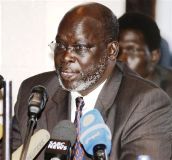Dutch minister wants Sudan rebel chief to help end conflict in Darfur
RUMBEK, Sudan, Jan 20, 2005 (AP) — The Dutch minister for development cooperation flew to a remote corner of Sudan on Thursday to press the southern rebel chief to use his influence over other insurgent groups to help end the deadly conflict in the country’s western Darfur region.
 Minister Agnes van Ardenne’s trip came as members of the rebel Sudan People’s Liberation Movement, or SPLM, discussed the structure of an autonomous government in the south, to be set up under a peace deal aimed at ending 21 years of civil war in the region.
Minister Agnes van Ardenne’s trip came as members of the rebel Sudan People’s Liberation Movement, or SPLM, discussed the structure of an autonomous government in the south, to be set up under a peace deal aimed at ending 21 years of civil war in the region.
U.N. and U.S. officials hope a solution to the southern conflict — Africa’s longest running war — will help end the separate conflict in Darfur.
SPLM chairman John Garang has indicated he will initiate contacts with two rebel groups in Darfur to share his movement’s experience negotiating a peace settlement, U.N. officials say. The two groups from Darfur’s African population revolted in February 2003 against the Arab-dominated government in the north for more power and resources in the arid region.
“One of my messages to John Garang is that he should use his influence to convince the rebel groups fighting in Darfur to end the violence,” van Ardenne said before leaving SPLM headquarters in Rumbek to meet Garang at a camp near the Kenyan border. “I know that he is very influential with both rebel groups.”
Van Ardenne arrived in Rumbek on Tuesday following talks in Khartoum, during which she urged government officials to also work toward a resolution of the Darfur crisis. The Netherlands is threatening to withhold US$100 million (euro77.3 million) in aid to Sudan unless the violence ends.
U.S. and U.N. officials say the government has armed mostly Arab militiamen known as the Janjaweed who have attacked African villages in a campaign of burning, looting, raping and killing in Darfur. An estimated 70,000 of the nearly 2 million displaced have died of hunger and disease since March. Many more were killed in the fighting, though no firm figures exist.
The southern war pitted the Arab Muslim-dominated government against rebels fighting for greater autonomy and a greater share of the country’s wealth in the mainly African Christian and animist south. That conflict is blamed for more than 2 million deaths, primarily from war-induced famine and disease.
The Jan. 9 peace deal offers southern Sudan an autonomous government led by Garang. His group will also take 30 percent of seats in a transitional national government in the capital, Khartoum.
Rebels have already started discussing the composition and structure of the southern government, said their spokesman, Yasir Arman. Senior rebel leaders, including Garang, are expected to gather here in the coming days for additional talks on the matter, Arman said.
Van Ardenne also plans to press Garang for details of his plans for the south, which has known only 10 years of peace since independence in 1956.
“I want to speak to him about his plans, his program to transform his movement — a guerrilla movement — into an authority movement,” van Ardenne said.
